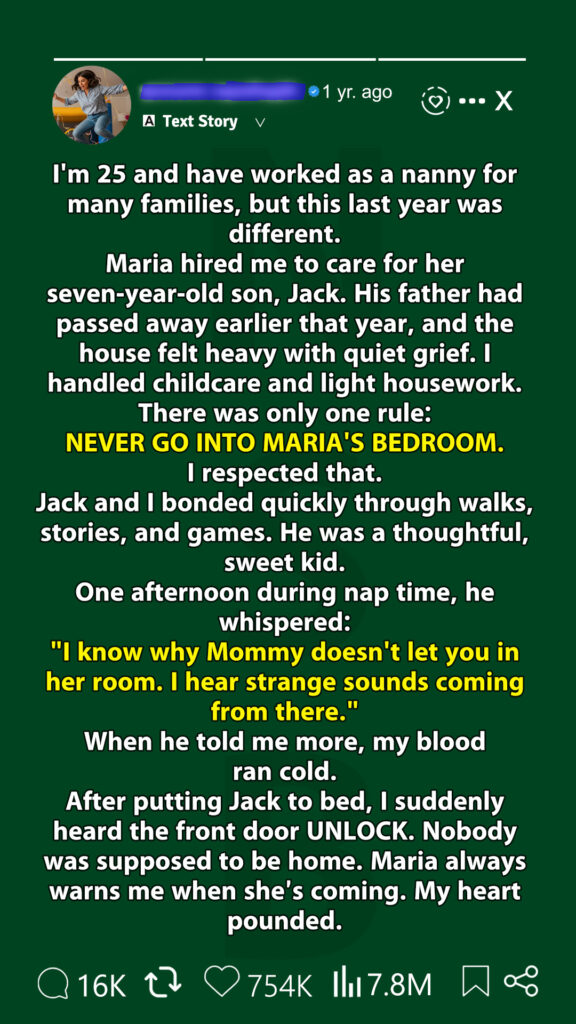I’ve worked with dozens of families over the years—some chaotic, some cold, a few that felt like home. But none stayed with me like Jack and his mother Maria. Their house smelled like cinnamon and laundry, but beneath the warmth was a silence that felt sacred. A silence shaped by grief.
Maria hired me to care for Jack, her seven-year-old son, after his father died in a car accident. She was kind but hollow-eyed, the kind of woman who’d cried so much she no longer needed to. She gave me full access to the house—with one rule: never enter her bedroom. “It’s the only space that’s still mine,” she said. I understood. Grief needs boundaries.

Jack was quiet at first. He spoke in whispers and moved like he didn’t want to disturb the air. But his imagination was vivid—he built forts out of couch cushions and drew galaxies with sidewalk chalk. Slowly, he let me in.
One afternoon, while we were coloring, he looked up and said, “My dad still visits me.”
I paused. “What do you mean?”
“He comes at night. He sits on the edge of my bed and tells me stories. He says he misses Mom but she can’t hear him anymore.”
I didn’t know what to say. I’d worked with grieving children before, but this felt different. Jack wasn’t scared. He wasn’t confused. He was certain.
“He wears the same shirt he wore on his last birthday,” Jack added. “The blue one with the tiny hole near the sleeve.”
I hadn’t seen photos of his dad. Maria kept everything tucked away. But Jack described him with such detail—his laugh, his smell, the way he used to tap Jack’s nose and say “Boop”—that I started to wonder if something more was happening.
I asked Maria about it gently. She stiffened. “Jack’s coping,” she said. “He’s imaginative. That’s all.”
But I saw the way her hands trembled when she said it. I saw the way she lingered outside Jack’s door at night, listening.
Weeks passed. Jack kept talking about his dad’s visits. He said his dad told him to be brave, to take care of Mom, to keep drawing. “He says love doesn’t stop just because someone’s gone,” Jack whispered one night. “It just changes shape.”
I started leaving the door to Jack’s room slightly ajar. I never saw anything. But sometimes, the air felt different. Warmer. Softer. Like someone had just left.
One evening, Jack handed me a drawing. It was of his dad—blue shirt, kind eyes, sitting on the edge of the bed. “He said you’re kind,” Jack told me. “He likes that you make me laugh.”
I cried in my car that night. Not because I believed in ghosts. But because I believed in love. And Jack’s love for his father was so strong, so pure, it felt like it could bend time.
Eventually, Maria began to open up. She showed me a photo album. There was the blue shirt. The nose tap. The laugh frozen in pictures. She said she used to feel him too—right after the accident. “But then I shut it out,” she admitted. “It hurt too much.”
Jack never stopped feeling him. And maybe that’s the lesson. That children carry grief differently. That love, when unfiltered by logic, can feel eternal.
I finished my year with Jack and Maria. I moved on to another family. But I still think about that house. That boy. That quiet magic.
And I wonder if Jack still hears bedtime stories from the man who loved him enough to stay—even after goodbye.


